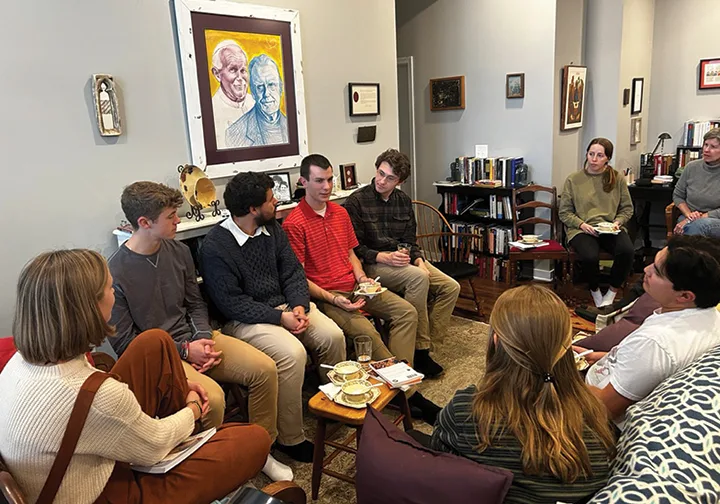
by Jack Figge
Special to The Leaven
ATCHISON — Shoes line the hallway, the savory smell of homemade soup wafts through the door and above the window hangs a sign that says: “The gathering place.” These are the sights and sounds of liturgy for Dr. Tory Baucum, but it’s a different type of liturgy — a domestic liturgy.
Every Sunday, a group of Atchison’s Benedictine College students gather at Tory and Elizabeth Baucums’ apartment to talk about life and learn about human love as part of the John Paul II Fellowship.
“I’m investing in a small group of students that I think will have an impact — a disproportionate impact — when they graduate,” said Baucum. “It may be for some that they just have really good families. That’s why my wife and I have them in our home every week — so that they can see how we practice hospitality with them, to give them a model, in the hopes that they will do something similar when they have their own home.”
Three years ago, Baucum arrived at Benedictine College to become the founding director of the Center for Marriage and Family Life. As part of his job, he was tasked with starting a fellowship for students centered on cultivating authentic love for the human person.
Thus began the John Paul II Fellowship.
Centered around three pillars — restoring, forming and exploring families — the JPII Fellowship seeks to form students into lovers of human love through embracing community, domestic liturgies and serving underprivileged communities.
Baucum hopes that by the time a fellow graduates, he or she will be a “lover of human love.”
“I want my students to become lovers of human love,” said Baucum. “People know what the church teaches about morality and sexual morality, and they know those are true. But if people here don’t know what love is and never experience it, then that is a problem.”
For Benjamin Hoopes and Axel Gomez, both seniors at Benedictine, the weekly community dinners have allowed them to grow as students of love through the shared interactions during these weekly dinners.
“The JPII Fellows have given me the tools to actually see the transformation of culture that we talk about at the college. It has been modeled to me through the way we interact with students at schools and through the liturgies that we have every Sunday night,” said Hoopes.
Each of these gatherings is treated as a domestic liturgy — a time in which the group meets, shares a meal and prays with one another.
“These Sunday night dinners are my favorite part of JPII Fellows,” said Gomez. “We gather together and learn about each other’s weeks, learning about where people are coming from, where they are going, their hopes and fears, praying for each other and enjoying soup with each other. It helps build community in this small group and the fellowship.”
Elizabeth believes her and Tory’s role is more than just feeding and creating conversations with college students; she sees her mission as setting an example of radical hospitality.
“When they graduate from the fellowship, I hope the students have a sense of empowerment, that they realize they have something to offer and that they have a way of giving — a way of being a minister — that can be very organic and very simple, making a space for hospitality and how important that is,” said Elizabeth. “That a little simple food is different from entertaining. I hope they see that there is a lot of power in people sharing a simple meal with each other.”
The group extends well beyond the Baucums’ living room, though. Fellows regularly teach underprivileged students at the Atchison public schools about human dignity and what authentic love looks like. Through teaching in a classroom and working with students, fellows such as Emily Hartmann see the practical application of what they discuss on Sunday nights.
“We have been reading Pope Francis’ encyclical ‘Frattelli Tutti,’ and a grace that has come from the fellowship is that Tory is really good at facilitating ways that we can put into practice what Pope Francis is asking us to do,” said Hartmann. “I can see how the things that we study are practically applied. We get to see grace at work and get the opportunity to work in other people’s lives.”
Through the weekly dinners with fellow students, teaching underprivileged students and witnessing the Baucums’ example of the domestic church, the fellows have learned about the depths and complexities of human love. As they move forward, they hope to bring their experiences and knowledge to their future communities and families.
“The JPII Fellows have made me a student of love, of human love. It has opened my heart to be more in love with human love,” said Gomez. “I’ve learned that love is messy, that life is messy and somehow, God rides straight through our messiness, through our filthiness, and has a plan to make it all good, to make it redemptive.”






